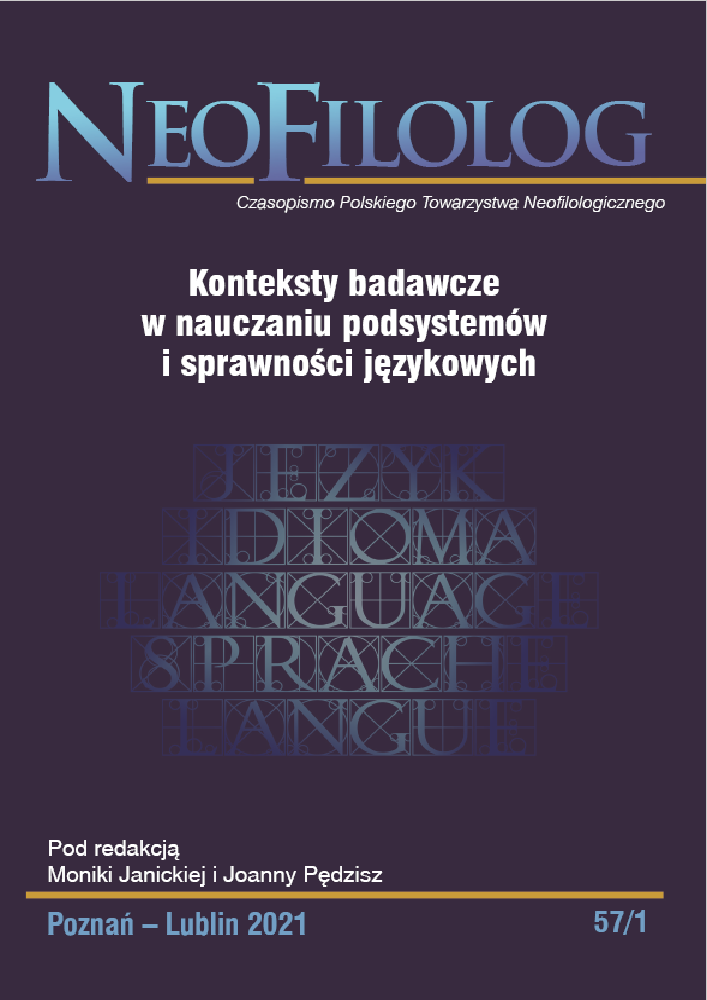Abstract
While learning a foreign language, students have to practice speaking through different activities in class. Unfortunately, speaking is often a challenge for students not only due to linguistic difficulties, but most importantly because of the stress caused by talking in a foreign language in front of their classmates. This phenomenon, called language anxiety, makes it impossible for some students to participate actively and thus to develop their speaking abilities. It is therefore important to understand which types of tasks cause the highest anxiety levels, as well as to find out what can help students overcome their anxiety. To answer these questions, we led a research among Polish high school students learning French. They were asked about their attitudes towards different speaking activities in class, as well as about the atmosphere in class. The results show students are the most stressed while speaking in front of their peers and prefer interaction in small groups. Language games also appear to lower the level of anxiety during speaking. In addition, positive atmosphere and lack of judgment help students overcome their fear, but they do not eliminate it completely for every person.
Literaturhinweise
Bawej I. (2017), Zjawisko lęku językowego w procesie nauki języka niemieckiego, (in) Neofilolog 42/2. Poznań : Polskie Towarzystwo Neofilologiczne, pp. 235-256.
Conseil de l’Europe (2001), Cadre européen commun de référence pour les langues : apprendre, enseigner, évaluer. Paris : Didier.
Conseil de l'Europe (2018) Cadre européen commun de référence pour les langues : apprendre, enseigner, évaluer. Volume complémentaire avec de nouveaux descripteurs. Paris : Didier.
De Vecchi, G. (2012), Évaluer sans dévaluer. Hachette, Paris.
Gregersen T., Horwitz E. K. (2002), Language learning and perfectionism: anxious and non-anxious language learners’ reactions to their own oral performance, (in) The Modern Language Journal 86. Oxford: Blackwell Publishing, pp. 562–570.
Guillon, M. S., Crocq, M. A. (2004), Estime de soi à l’adolescence : revue de la littérature. Neuropsychiatrie de l’Enfance et de l’Adolescence, 52(1). Issy-les-Moulineaux : Elsevier Masson, pp. 30–36.
Horwitz E. K., Horwitz M. B., Cope J. (1986), Foreign Language Classroom Anxiety, (in) The Modern Language Journal 70-2, pp. 125-132. Extrait de : http://www.jstor.org/stable/327317 [Consulté le 23/11/2020] .
Hymes D. (1974), Foundations in Sociolinguistics: An Ethnographic Approach. Philadelphia: University of Pennsylvania Press.
Jochimczyk M. (2020), Praca z tekstem pisanym jako element interakcyjnego modelu kształcenia (in) Języki Obce w Szkole 2020/3. Warszawa : FRSE, pp. 35-38.
Kalińska-Łuszczyńska S. (2016), Corrélats de l’anxiété langagière, (in) Romanica Cracoviensia 16/2. Cracovie : Wydawnictwo Uniwersytetu Jagiellońskiego, pp. 75–96
Kerbrat-Orecchioni C. (1992), Les Interactions verbales, tome II. Paris: A. Colin.
Kerbrat-Orecchioni C. (2005), Le discours en interaction. Paris: A. Colin.
Komorowska H. (2004), Polityka językowa – warianty rozwiązań w krajach europejskich, (in) Języki Obce w Szkole 2004/2. Warszawa : FRSE, pp. 38–45.
Laustriat D. (2015), Construire un climat de classe positif, bienveillant et créatif, vers un environnement d’apprentissage optimal. Revue de littérature théorique. Munich : SynLab.
Lewkowicz J., Zawadowska-Kittel E. (2008), Impact of the new school-leaving exam of English in Poland, (in) Research Notes 34. Cambridge : ESOL, pp. 27-31.
Łącka-Badura J. (2020), Rola zachowań budujących bliskość interpersonalną w kształceniu językowym dorosłych, (in) Języki Obce w Szkole 2020/3. Warszawa : FRSE, pp. 31-34.
Molska M. (2020), Certyfikacja biegłości językowej w ujęciu kształtującym, (in) Języki Obce w Szkole 2020/3. Warszawa : FRSE, pp. 85–91.
Pawlak M. (2020), Korekta błędów językowych jako integralny element interakcji w klasie językowej (in) Języki Obce w Szkole 2020/3. Warszawa : FRSE, pp. 39-46.
Piechurska-Kuciel, E. (2012). Gender-dependent language anxiety in Polish communication apprehensives, (in) Studies in Second Language Learning and Teaching 2/2. Poznań : Uniwersytet Adama Mickiewicza, pp. 227-248.
Salins G. D. (1992), Une introduction à l'étnographie de la communication : pour la formation à l'enseignement du français langue étrangère. Paris : Didier.
Szupica-Pyrzanowska M. (2021), Czy mózg może przeszkadzać w nauce języka obcego? Neurolingwistyczna i neurokognitywna reprezentacja negatywnych emocji, (in) Języki Obce w Szkole 2021/2. Warszawa : FRSE, pp. 13-18.
Taylor L. (2005), Key concepts in ELT, (in) ELT Journal 59/2. Oxford : Oxford University Press, pp. 154–155.
Wilczyńska W. (1993), La compréhension orale en langue étrangère en tant que construction du sens. Poznań : Uniwersytet Adama Mickiewicza.
Young D. J. (1991), Creating a Low-Anxiety Classroom Environment: What Does Language Anxiety Research Suggest? (in) The Modern Language Journal 75-4. Oxford : Blackwell Publishing, pp. 426-439.
Lizenz
Copyright (c) 2021 Julia Lipińska

Dieses Werk steht unter der Lizenz Creative Commons Namensnennung - Keine Bearbeitungen 4.0 International.
Autoren:
Die Autoren der zur Veröffentlichung in der Zeitschrift Neofilolog angenommenen Texte sind verpflichtet, den Vertrag über die Erteilung einer kostenlosen Lizenz für die Werke mit der Verpflichtung zur Erteilung einer Sublizenz CC auszufüllen, zu unterzeichnen und an die Adresse der Redaktion zurückzusenden.
Gemäß Vertrag erteilen die Autoren auf die in der Zeitschrift Neofilolog veröffentlichten Texte der Adam-Mickiewicz-Universität in Poznań eine nicht exklusive und kostenlose Lizenz und erlauben die Verwendung der Sublizenz Creative Commons Attribution-NoDerivatives 4.0 International (CC BY-ND 4.0).
Die Autoren behalten das Recht zur weiteren freien Verfügung über das Werk.
Benutzer:
Interessierte Onlinebenutzer dürfen die seit 2017 veröffentlichten Werke unter folgenden Bedingungen nutzen:
- Anerkennung der Urheberschaft - die Verpflichtung, zusammen mit dem verbreiteten Werk Informationen über die Urheberschaft, den Titel, die Quelle (Links zum Originalwerk, DOI) und die Lizenz selbst bereitzustellen;
- ohne Schaffung abgeleiteter Werke - das Werk muss in seiner ursprünglichen Form erhalten bleiben, ohne Zustimmung des Autors dürfen keine Studien, beispielsweise Übersetzungen, verbreitet werden.
Die Urheberrechte aller veröffentlichen Texte sind vorbehalten.
Sonstige:
Die Adam-Mickiewicz-Universität in Poznań behält das Recht auf die Zeitschrift als Gesamtheit (Layout, Grafik, Titel, Umschlagsprojekt, Logo usw.).

